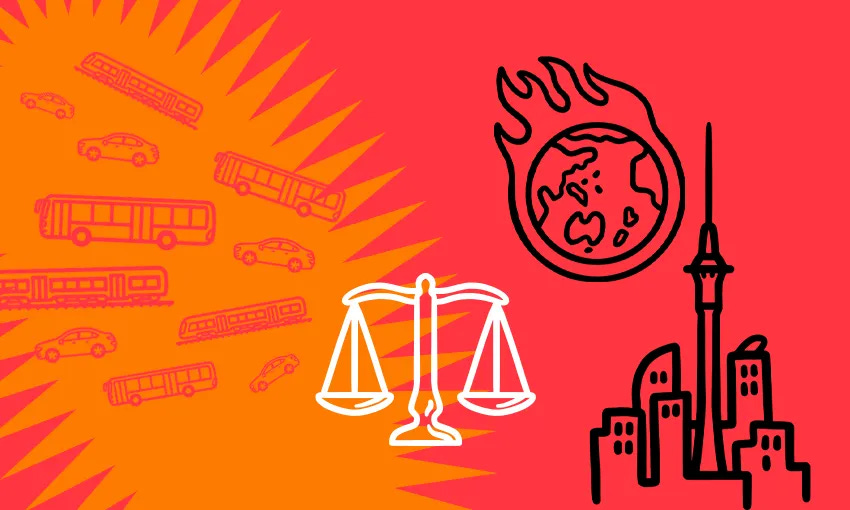New measures to combat Covid at orange, Greens call for clarity
As Covid case numbers rise, a move to red has been ruled out raising questions around the purpose of the traffic light system and a lack of clarity
Mōrena and welcome to The Bulletin for Thursday, July 14, by Anna Rawhiti-Connell. Presented in partnership with Z Energy.
In today’s edition: OCR rises and knowing when the reserve bank’s plan is paying off; government has facial recognition system developed; reaction to gang law plans; but first, a preview of today’s Covid announcement.
Covid response minister Ayesha Verrall will announce new Covid measures this afternoon (Photo: RNZ / Samuel Rillstone)
Wastewater testing shows case numbers are rising much faster than expected
As the Herald’s Claire Trevett reported last night, today’s announcement about our ongoing response to Covid is tipped to include a provision of more free rapid antigen test (RATs) and masks. The provision of RATs is based on concerns that people aren’t testing and isolating. This morning the Herald is reporting that wastewater testing is showing that case numbers are rising much faster than expected. No changes to the current mask rules and isolation periods for the orange setting are expected. Covid response minister Ayesha Verrall will make the announcement this afternoon, after cabinet met on Monday. Stuff’s Kate Newton and Keith Lynch outline what we’re currently up against, taking a look at reinfections and why we’ll see more hospitalisations with this wave.
What is the red setting for?
Yesterday prime minister Jacinda Ardern once again ruled out a return to “red”. We are back to hospitalisation and case numbers that mirror late March and early April this year when we were last in the red setting. The government’s position on the efficacy of restricting numbers at gatherings has been backed by some experts who want a focus on mask-wearing and ventilation. As Siouxsie Wiles writes “it’s well past time for the Covid Protection Framework to be revamped so that it focuses on ways we know we can reduce the spread of Covid through the air”. Terrible segue but also hanging in the air is a legitimate question about what the red setting, and indeed the traffic light system, is for. Perhaps an even worse variant that’s specifically not an iteration of the current variant?
What if new versions of omicron are more transmissible?
That seemed to be the gist of the ministry of health’s scenario planning to tackle new variants, announced three weeks ago. Outgoing director general of health Ashley Bloomfield said “we're assuming that the new variant has to be more transmissible than omicron”. But what if new versions of omicron are more transmissible? Virologists have voiced concerns about the emergence of another fast-spreading omicron variant BA.2.75 (nicknamed “Centaurus”), which is rapidly gaining a foothold in India and has already arrived in the UK. Wastewater testing results report that four cases have been found in New Zealand, all of which are currently associated with the border.
Greens call for return to clarity, say messaging is muddled
I don’t ask these questions as someone attempting a “gotcha”, I ask them as a person trying to reconcile the traffic light settings with the scenario planning and the current situation. Maybe I have some nostalgia for the clear communications of 2020. The Green party is calling for a return to that clarity saying the government's messaging has become "muddled". In a report from the ABC yesterday about rising cases in Australia, bioethicist Dr Diego Silva said people should demand that governments make the reasoning behind their decisions explicit. It’s a fair point, albeit in the context of the federated system in Australia. When we are being asked to essentially take individual responsibility for protecting our own health and the health of those around us, wouldn’t more knowledge be power? Or are we past absorbing it any more?
Could information be our next big export?
Made in partnership with New Zealand Trade and Enterprise, the fourth episode in The Spinoff's new podcast series Going Global is out now. This week sees Ethique's Brianne West and Business is Boring’s Simon Pound talk to Lucy Blakiston, co-founder and CEO of Shit You Should Care About (SYSCA), a global news brand that's amassed 3.6 million social media followers.Blakiston is an unlikely exporter – she's not sending physical products overseas, but her brand is undeniably international. SYSCA is known best for digesting the biggest news stories in the world and giving them context relevant to their young audience through podcasts, a daily newsletter and their social media. Listen to Going Global on The Spinoff Podcast Network. (Sponsored)
Research from ASB economists shows risk of inflation becoming more persistent
As expected, the reserve bank (RBNZ) lifted the official cash rate to 2.5%, the highest it’s been since January 2016. The rate began dropping after that and continued to do so until October 2021. In keeping with an admittedly slow-burning tradition in The Bulletin, the number one song in January 2016 was “Love Yourself” by Justin Bieber (not ringing any bells for me). The RBNZ said it remains "resolute" in its commitment to get inflation down and back into its targeted 1% to 3% range. ASB economists said the key question is when will the RBNZ have confidence that it is getting closer to meeting its targets. Their research suggests there is some risk that inflation is set to become more persistent, particularly if the labour market remains tight. Stuff’s Tom Pullar-Strecker looks at the likely impact of the rate rise.
Ministry of Health considered using photos from driver licences or passports for My Health accounts
After a series of questions posed by RNZ, Phil Pennington has uncovered that government agencies have a facial recognition system set up to share driver licence photos with the Covid vaccine passport scheme. After a third approach from RNZ, the ministry of health said on Tuesday that it had considered using photos from driver licences or passports for the My Health account (used to issue vaccine passports) but did not. In correspondence dating back to 2020, the trail reveals conversations between various agencies including New Zealand transport agency Waka Kotahi, the Ministry of Social Development, the Ministry of Education, Ministry of Health, the Department of Internal Affairs and the privacy commissioner. The Digital Identity Services Trust Framework Bill is currently due for a second reading. As Pennington writes, the bill extols the benefits of transparency.
Big thank you to Brightly who has just joined us as an organisation member. Their support means so much to us! If your organisation is keen to support us, please get in touch or head over to our members page for more info.
Gang package cops flack from National and the Greens, expert says it looks good
Yesterday the government announced a new set of tools to give police expanded powers for dealing with gang violence including a new intimidation offence. Stronger search and seize powers were also announced but will still need a warrant. As RNZ’s Craig McCulloch reports this morning, sociologist and gangs researcher Jarrod Gilbert said while details were scant, the approach looked measured and, importantly, well-targeted. Opposition leader Christopher Luxon said the plans were “mere tinkering”, while Green party justice spokesperson Golriz Ghahraman said she was disappointed to see Labour joining National in adopting "knee-jerk" gang policies.
Click and collect
Wellington stadium short-staffed ahead of Saturday’s All Black test
A look at the finances of New Zealand’s billion-dollar school, Dilworth
Had to laugh at the government slightly jumping the gun yesterday on announcing that the Waikato expressway was open. I’ve been on expressway watch for weeks.
This piece on the Christchurch stadium gets a shout for being very good but also because it’s an outstanding riff on a canonical episode of The Simpsons.
Stats NZ explains how it collects migration data after news that 11,000 more people left the country in the year ended May than arrived. It’s not with a clipboard at the airport.
Got some feedback about The Bulletin, or anything in the news? Get in touch with me at thebulletin@thespinoff.co.nz
A collection of climate advocates recently sued the council and AT, accusing them of failing to comply with the council’s own climate plans. Hayden Donnell explains why the judgement could have far-reaching implications. Duncan Greive outlines how social media has turned its back on news media and why newsletters like The Bulletin are booming. Charlotte Muru-Lanning learns how BurgerFuel are rescuing ingredients destined for the scrapheap. Tara Ward says we should be watching Sherwood, the compelling new BBC crime drama that just landed on TVNZ+. Madeleine Chapman reviews the new Whittaker's oat milk chocolate.
Covid impacts on athletes at Commonwealth Games
As the Sydney Morning Herald reports, Australian athletes will be banned from supporting their team mates at other Commonwealth Games events at Birmingham due to the risk of Covid transmission. Athletes were subject to strict Covid protocols at the Beijing Winter Olympics this year and at last year's summer Olympics in Tokyo. Australia’s chef de mission Petria Thomas said the team is adding extra measures on top of those already outlined by games organisers. The measures also include mask-wearing at all times unless they were competing, walking outdoors, or alone in their rooms.
A personal note
On Monday, it will have been three months since I started this great gig as editor of The Bulletin. A couple of weeks after I started, someone at The Spinoff said I should introduce myself. At the time I waved the suggestion away, saying our previous editor Justin had already done it. While this feels a little like singing happy birthday to myself and overkill on an introduction, I recently talked to Duncan Greive on his podcast The Fold about writing The Bulletin, my new gig as newsletter editor at The Spinoff (will still be writing The Bulletin), my winding road to this job, the state of social media and why I love newsletters like this. It connects to Greive’s piece linked above about the form and why they’re becoming so important to us at The Spinoff. As readers of The Bulletin, you have been somewhat ahead of the curve on all this and your response to it has helped shape where we’re heading. Thank you.











